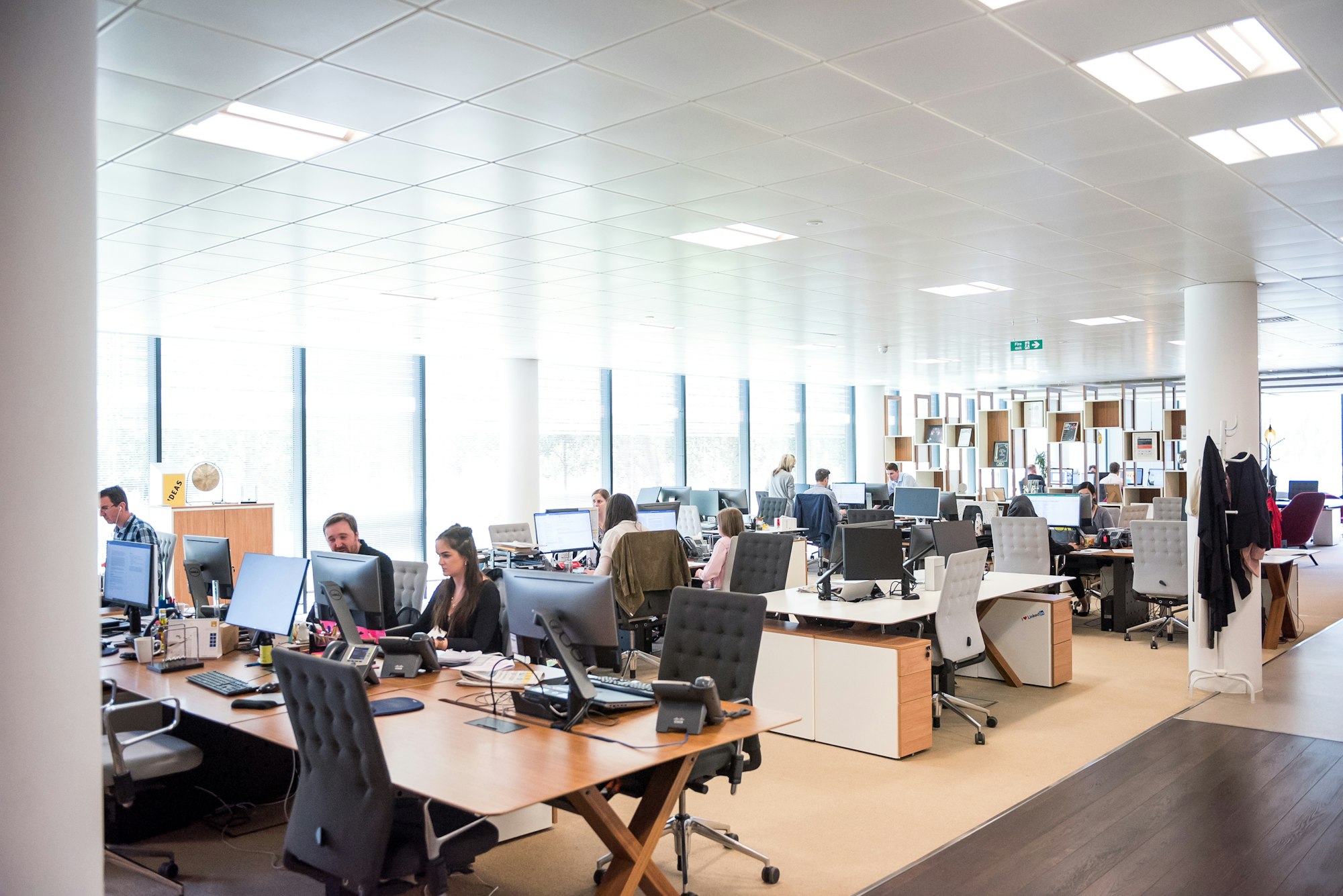Sabbatical lessons, part 4: People and culture

This is the fifth and final post in my series on lessons learned while on sabbatical. Here are the first, second, third, and fourth posts.
Tomorrow my sabbatical ends. After roughly 300 days of being the embedded academic at Steelcase and immersing myself in the research, business, and outreach activities of Steelcase Education and the Workspace Futures group, I'll finally hang up my lanyard, drive out of the parking lot at 44th and Eastern in Grand Rapids for the last time, and transition back into being a professor.
In the run-up to tomorrow's final day, I've been trying to blog here about what exactly I've learned during my 300-ish days on sabbatical in industry. I made up a top 10 list and wrote blog posts up through lesson number 4 before I started falling behind. I had intended to write one post per lesson, roughly twice a week for five weeks leading up till tomorrow. But I got stuck, and now here we are, with me owing you six blog posts in the next 36 hours. That's not going to happen. Instead, the more I considered it, the more I realized I was overthinking the last six lessons in my list. While I consider those lessons separate, namely:
- Workplace culture trumps everything.
- In a great company, everybody assumes responsibility for everything.
- There is great power in a diverse team working with a single purpose.
- College faculty are smart creatives.
- The future of work is a whole lot of both-and’s, not either-or’s.
- Higher education is at a turning point, and it can either adapt and thrive, or stay put and be irrelevant.
...in another sense I can sum them all up, except for the next-to-last lesson, in one phrase:
People are everything. The future of businesses, and colleges and universities, stands or falls on its beliefs and behaviors about people.
So I am throwing away all the outlines and drafts I'd made for the last few posts in this series, and am going to write mostly off-the-cuff about the impact that people, and what I've learned about people, have made on me during my sabbatical.
What I will miss the most from Steelcase
What I will miss the most from Steelcase are the people with whom I worked, and the workplace culture in which we worked together.
The Steelcase Education group is/was a diverse team in the fullest sense of both of those words "diverse" and "team". We consisted of managers, sales people, designers, marketers, market researchers, and one displaced mathematics professor, with other players coming in and out from other groups. One of the managers has an engineering degree. One of the designers has a science background. We were all over the map, educationally speaking as well as literally, with different cultural backgrounds represented, as well as a nearly 50-50 male/female composition (more women than men). And yet, as diverse as the team was, it wasn't divergent but rather actually a team, with each person having a specific role to play but also having significant knowledge of all the operations of the group. And especially, every single person in the group was fully aware of, and fully bought into, the mission of the company and of the group, and never, ever slacked off in pursuit of making each one better.
Case in point: Back in the fall, several of us, along with others from different parts of the company, were summoned to attend a two-day, all-day meeting in downtown Grand Rapids (away from the usual campus) to brainstorm ideas for the Education group's major business plans for the next 5-10 years. It sounds like a "retreat", and in higher education, faculty retreats are usually cause for groaning and sudden illnesses. I felt the same way about this one. But I was wrong. All of us in the room showed up with a sense of purpose, even urgency, in working through what the facilitators wanted us to work through, and we worked hard for those two days to come up with prototypes for business ventures that could push the company and the education group forward. It was a diverse group, completely in one accord, all moving and working in the same direction to accomplish a common goal. It was unprecedented for me, coming from higher education where this level of energy and focus is rare, even unheard-of in faculty meetings.
So I learned that there is great power in a diverse team working with a single purpose. I also learned that in a great company, there are no silos and no deflections of their work: Everybody assumes responsibility for everything.
Not every day at Steelcase was like this. There were many days that had nothing on the calendar at all, which I spent mostly reading research papers and working on ongoing projects. There were some meetings that were as interminable as some faculty meetings. But still, it was a pleasure going into work on the three days a week I was scheduled, because I knew I was walking into a group that worked hard, had big ideas, and had room for everybody's talents and ideas, even a lowly intern who was also a math professor and didn't really belong.
Except for that I did belong.
And that gets us to culture
The culture of an organization refers to the values, beliefs, norms, and rituals that the organization uses to assign meaning to the things with which it's involved. It's been more succinctly put as "the invisible glue that holds an organization together" or simply as "the way we do things around here". In my business-oriented reading on sabbatical, I came across the famous quote attributed to management guru Peter Drucker that says Culture eats strategy for breakfast. That is, it doesn't matter what your plans or your vision is; if you don't have an organizational culture that doesn't support that strategy, it's doomed. That quote has been extended to say Culture trumps everything --- a statement with which I strongly agree, and I consider it to be the main lesson I've learned about leadership. It doesn't matter what your organization says it believes; if the culture says otherwise, the culture is the one that's right.
I could describe the workplace culture at Steelcase in the following ways:
- Collaborative. While it wasn't uncommon for people to do heads-down work by themselves, collaboration was the default. We worked in an open area with little to no barriers between our workstations --- and it was fine. Nobody thought twice about grabbing another person to give input on a project. And when you were the person being grabbed, you rolled with it. And it was all tremendously fun, even (especially?) in those instances where I had no idea what I was doing but simply hoping to give input that would be marginally helpful.
- Psychologically safe. People in the Education group, and I think this was true throughout the company, felt empowered and free to give their inputs on anything and to anyone, in a professional manner, regardless of the power differential between them. There was an unshakable sense that if you spoke your mind, as long as you were civil and thoughtful about it, you were not going to be retaliated against or shamed.
- Drama-free. Every single person at Steelcase is an absolute professional. Over a nine-month period, I experienced precisely zero instances of gossip, backbiting, mansplaining, condescension, meanness, brown-nosing, egotism, narcissism, or selfishness. Even complaining was done in a civil manner, and there weren't too many of those complaints.
- Energetic with a bias toward action. The most surprising thing I encountered early on at Steelcase was how fast things seemed to move. There were big ideas always in play. Plans and strategies were agile and changing from day to day based on yesterday's data. When a big idea was ready to ship, it shipped --- no committees for it to get stuck in. Stuff got done, in a major way and all the time.
A culture like this will naturally produce highly productive, and very happy workers, especially if they are smart creatives. (Read the article at the link for a definition of that term.) And Steelcase is built on smart creatives. I'm not sure which came first: The culture that allows smart creatives to thrive, or the smart creatives who thrive in that culture. It's probably both; the culture both shapes the worker, and is shaped by the worker.
Which brings us back to higher education
I have a confession to make at this point.
About a year out from my sabbatical starting, when it was still in the planning phase, I knew that whatever final shape the sabbatical took, it had to be for a full year and it had to include the summer before and after that year. This is because I was completely burnt out on teaching, physically and psychologically spent, and if I'm being honest, ready to throw in the towel and find another line of work. I needed 15 months away from the classroom or else I was going to implode.
It's difficult to articulate why, both because some of my experiences leading up to the sabbatical were difficult, and because it's hard to track down exactly where my burnout came from. The year prior to the sabbatical I had a few students --- a tiny minority --- who complained, challenged, and disagreed with me and my teaching vocally at every turn, and after a year of this, I was completely worn down, losing sleep, and experiencing actual physical health concerns --- this despite the incredible group of mathematicians I work with in the department and the great relationships I had with other students.
Going back further, I came to GVSU in 2011 having left another college where my involvement with that school had turned toxic, living and working in a culture that said, literally, that I was a liability to the college and that I needed to shape up or I might find myself dismissed (even though I had tenure). I have never spoken about that situation in a public venue before, because there is much blame to go around including to myself, as well as many people there who I admire and am grateful for. But certainly, I don't think I have ever come to terms with how that situation ended, and this too was wearing on me from the inside out, in the form of ongoing, unshakable impostor syndrome and permanent shame.
So I confess that my sabbatical was primarily about doing research in active learning and active learning spaces and in doing outreach and professional development on those topics. And I got almost everything done that I had planned to do. But it was also, to a great extent, about deciding what I wanted to do with myself for the next 20-30 years, and in particular whether I should stay in higher education or change professional direction. I've come to the conclusion that I still belong in higher education. But I've also decided, having seen what a truly great workplace culture can look like, that higher education has to change --- in a lot of ways, but primarily in the culture it maintains and in the way it treats people. In terms of my "lessons learned", higher education is at a turning point. It can either adapt and thrive, or stay put and be irrelevant. And the fulcrum for that turning point consists of people and culture.
It does us in higher education absolutely no good to have innovative instructional models, carefully crafted vision statements, or highly productive research programs if we treat people like objects and set up workplace cultures that devalue the humanity of people who work with us. This can happen when we engage in student shaming, use leadership positions as an excuse to intimidate colleagues, play backroom politics in our departments, or any of a myriad of other behaviors that use people as tools to get what one wants. Culture trumps everything. When the culture is psychologically unsafe, narcissistic to the core, and predicated on power and office politics, it doesn't matter what the university says it values. Its real values are all too visible.
I want to see a higher education where the culture is a lot more like what I experienced at Steelcase: collaborative (not isolated or ego-centric), psychologically safe (not fearful or political), devoid of drama (not choked by narcissism), and energetic with a bias to action (rather than reactive and glacial). Being in a culture like this for a year has spoiled me, and I don't think I can go back to anything else. That's the kind of culture I intend to help build once I'm back. I want to see a culture in higher education that assumes the best about faculty, students, and everyone else involved and crafts its vision statements and policies accordingly. I want to experience a culture where faculty -- tenure track and contingent -- are supported and provided with the tools they need to do their smart creative work. I want to teach in a culture where students are valued and not shamed, challenged and not ignored, supported and not weeded out. I even want to see an administrative culture that operates by focusing on people, and asking questions like "What do you need?" and "How can I help?"
Building a good culture takes work. Building a negative culture takes no work --- in fact it's the evidence that no work is being done. Higher education can have that culture if it chooses to put in that work. It starts with you and me.
So what's next?
As I said, I have 90 days to re-learn how to be a professor. In many ways this is a gift. I have the chance to do a hard reboot on any facet of my profession that I choose, especially teaching. That chance doesn't come often or to everyone, and I'm taking the opportunity to seriously rethink my teaching from the ground up. I have ideas for some major changes and some things I know I want to keep more or less the same. Watch this space for updates.
I'm also starting this fall as Assistant Chair in my department. We have a large department (30 tenure-track faculty) and so we have one Department Chair and two Assistant Chairs. I will be involved with faculty searches, course scheduling, and some aspects of personnel review --- all key tasks tied directly with the sort of culture-building I just described. I have never been assistant chair of anything, so I'll be putting the wings on the plane while it's still in flight. But this is how my whole career has gone, so I'm used to it. It will be a prime opportunity to put into practice what I've learned about leadership, innovation, and organizations while at Steelcase.
In the meanwhile, over the summer, I am taking it slow, as we all should do if given the chance. August will be here soon enough.


